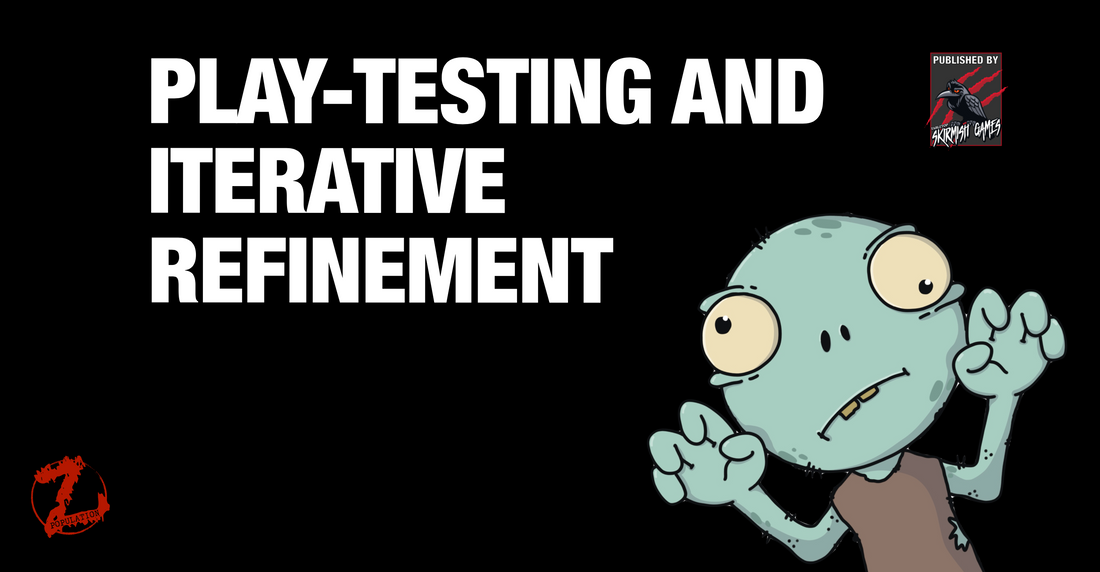Play-testing and Iterative Refinement in Tabletop Skirmish Game Design
Play-testing and iterative refinement are crucial if you want to design a successful tabletop skirmish game. In this blog post, we’ll discuss the significance of these crucial stages, delving into the iterative process that refines a game's core mechanics and solidifies the gameplay loop.
Building a Strong Foundation: Core Mechanics and Gameplay Loop
As we’ve seen in the previous blog posts, creating a tabletop skirmish game begins with laying a robust foundation that comes in the form of core mechanics and a gameplay loop. The play-testing and iterative refinement process is essential to make sure both elements work together to create a game that flows and makes sense to the players.
In Population Z the play-testing process has helped in so many areas from combat mechanics to ironing out little incongruences between feedback and rewards. As a game creator, you can write out a rule of mechanic that makes sense on paper but when it translates to the tabletop - and the interpretation of a player - it can often fall short. Play-testing allows you to pick out these areas and tweak them until they work as you initially planned.
Identifying Areas for Improvement: The Playtester's Lens
Play-testing serves as the lens through which game designers perceive their creation. Feedback from play-testers provides invaluable insights into aspects that may need refinement. Whether it's a balance issue, unclear rules, or unanticipated player behaviours, play-testing highlights the areas awaiting improvement.
For example, during playtesting of Population Z, it became apparent that a certain weapon could be used by a certain character build allowing them to move out of cover, fire, and then move back into cover again. The weapon was powerful and the temptation to play it this way caused a loop that was both boring and overpowering. Recognizing this through player feedback, I made an iterative refinement, introducing a reload action to that particular weapon to ensure a more balanced and enjoyable experience.
That is one of dozens of examples I could share, and in the early play-testing games there has been a lot of changes. Some have been small with only a slight change to a statistic or characteristic while other changes have been more dramatic resulting in a complete rethink to even imminence from the game.
The Benefits of Soliciting Feedback: A Collaborative Design Approach
Engaging play-testers as collaborators rather than mere evaluators transforms the design process into a dynamic dialogue. Their experiences and perspectives become integral in shaping the game's evolution, fostering a sense of community around the tabletop. Make it a fun experience, choose people you know like the genre and who are supportive of what you do.
It’s good to mix playing with your play-testers and letting them play without you. Being present during play-testing doesn’t mean you won’t get honest feedback or that the play-test will be skewed. Where I’ve needed to focus on a particular mechanic or scenario in Population Z, I’ve acted as GM and controlled the zombies while giving rules support to the players. They work within the rules, carry out actions and tactics I never would have planned or thought of, and reveal any flaws or happy accidents. Being present allows them to ask questions which in turn leads to fun new ideas that benefit the game.
During the process, you’ll get lots of ideas but remember that you don’t have to take every suggestion into account. There will be times as a creator when you want a specific rule or mechanic in place because you think it benefits the game or affects something the play-testers haven’t considered or even know about. On the flip side, listen to your play-testers and try to create an environment where your play-testers are comfortable to give criticism, feedback and suggestions. Take notes and don’t feel pressured to make any decisions on the spot.
When you come to distribution you game it will be played by other people who only have the book as a reference and not you or your intentions. This is why play-testers are so important as they are viewing your game from a completely different perspective and will point out things future players would no doubt encounter too.
Early Detection of Design Flaws: Navigating Pitfalls
Play-testing serves as a preemptive strike against potential pitfalls. Early detection of design flaws allows game designers to course-correct before these issues become deeply ingrained in the mechanics of the game. This proactive approach ensures that the game evolves organically, avoiding major disruptions down the line. The last thing you want to do is publish the game and then find out from your customers that there is a critical flaw in the mechanics.
In an early play-test session of Population Z, it became evident that a particular scenario led to stagnation rather than dynamic gameplay. What sounded good on paper just didn’t translate to the tabletop. Discovering this early allowed me to revise the scenario, introducing new elements that achieved the original goal and kept the game flowing smoothly.
Play-testing and Iterative Refinement in Tabletop Skirmish Game Design
Taking a game from an idea or to a draft and then to a tested and viable product is a big undertaking that takes a lot of work and effort. But don’t let that put you off! If you have an idea then go for it. Put together a set of rules and play them out with your friends and family. Each play-test session, each round of feedback, and every adjustment made during the iterative process contribute to the overall success of your games.
As a game designer and tabletop skirmish game enthusiast, the collaborative spirit of play-testing is something I enjoy. I’m really grateful to have found such a great bunch of people to help me develop Population Z through play-testing and have been enjoying the process a lot. Through iterative refinement, we don’t just shape our games and bring them to life but also create fun experiences and awesome memories with our friends and family.
I hope you’ve found this blog post helpful and I’d love to hear your thoughts and opinions on the subject, so join in the conversation in the comments below.
Thanks for reading!
Lee
Look out for my new game, Population Z: Welcome to Huntsville, launching in January 2024.

